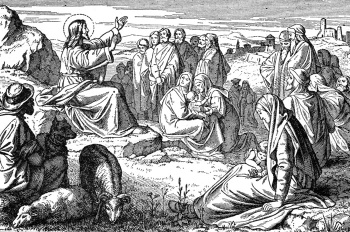.
This is my Easter Sunday talk I will give at church tomorrow. For a more traditional message watch the video.
Speaking In Church
I got a phone call from Brother Platt on April 1st asking me to speak in sacrament meeting. I thought it might be an April fool. When Brother Platt said that the bishopric needed a good speaker for Easter and they thought of me then I knew for sure it was an April fool.
On the 22 January 2009 President Obama signed an executive order that in part says, “…to be sure that our policies and practices comply with all obligations and are sufficient to ensure that individuals do not face torture and cruel treatment….” It appears that Brother Platt is not complying with this executive order — he’s still asking members to give talks.
My family enjoyed listening to all the sessions of General Conference. But half way through the last session on Sunday afternoon all of our family fell fast asleep. Two of Jake’s friends who were with us were most co-operative — they fell asleep also. We awoke to hear President Monson give a special message which we felt was just for us:
May we long remember that which we have heard during this conference. I remind you that the messages will be printed in next month’s Ensign and Liahona magazines. (Thomas S. Monson, “Until We Meet Again,” 179th Annual General Conference, April 2009)
The Life of Jesus Christ
I was requested to speak on the life of Jesus Christ. You all know a lot about His life. You know about the birth of Jesus; the friends of Jesus (John the Baptist and the twelve Disciples); the teachings of Jesus (the Sermon on the Mount and Parables); the miracles of Jesus (His power over nature, disease, and death); and the trials of Jesus (death, burial, and resurrection). In the time I have alloted I will concentrate mostly on the parables of Jesus and what he taught us about money. I will quote from our leaders and also I will add my own two shekels.
Parables
It is important to distinguish between the interpretation of a parable and the application of a parable. The interpretation is the meaning the parable conveyed when first spoken. The application of a parable may vary in every age and circumstance. But if the original meaning is to be grasped, it is important to consider its context and setting. The parable draws a picture of life as it is, not as it ought to be, and compares certain points in this picture with heavenly doctrine. (See Parables, Bible Dictionary)
The Parable of the Building of the Tower
The parable of the building of the tower reads:
If any man come to me, and hate not his father, and mother, and wife, and children, and brethren, and sisters, yea, and his own life also, he cannot be my disciple. And whosoever doth not bear his cross, and come after me, cannot be my disciple. For which of you, intending to build a tower, sitteth not down first, and counteth the cost, whether he have sufficient to finish it? Lest haply, after he hath laid the foundation, and is not able to finish it, all that behold it begin to mock him, Saying, This man began to build, and was not able to finish. (Luke 14: 25-30)
Elder Talmage explains the seemingly harsh words:
So now to the eager multitude Jesus applied a test of sincerity. He would have only genuine disciples, not enthusiasts of a day, ready to desert His cause when effort and sacrifice were most needed. Thus did He sift the people…. Literal hatred toward one’s family was not specified as a condition of discipleship; indeed a man who indulges hatred or any other evil passion is a subject for repentance and reformation. The preeminence of duty toward God over personal or family demands on the part of one who had assumed the obligations of a disciple was the precept. As Jesus pointed out, it is good common-sense to count well the cost before one enters upon a great undertaking, even in ordinary affairs. A man who wishes to build, say a tower or a house, tries to determine, before he begins the work, what the expense will be; otherwise he may be able to do no more than lay the foundation; then, not only will he find himself a loser, for the unfinished structure will be of no service, but people may laugh at his lack of prudent forethought. (James E. Talmage, Jesus the Christ, Salt Lake City: Deseret Book Co., 1976, 453.)
In the economy of recent years many built or bought a home without sitting down first and counting the cost. Among unwise decisions were buying homes with the sole purpose of making a quick profit from a rise in value, using a variable rate interest instead of a safer fixed rate, and buying property above one’s means. The result was an 81% rise in foreclosures in 2008 in excess of 2.3 million homes. It is indeed wisdom to build or buy a modest home as has been counseled by President Hinckley:
When I was a young man, my father counseled me to build a modest home, sufficient for the needs of my family, and make it beautiful and attractive and pleasant and secure. He counseled me to pay off the mortgage as quickly as I could so that, come what may, there would be a roof over the heads of my wife and children. (Gordon B. Hinckley, “The Times in Which We Live,” Ensign, Nov 2001, 72)
The Parable of the Unmerciful Servant
Therefore is the kingdom of heaven likened unto a certain king, which would take account of his servants. And when he had begun to reckon, one was brought unto him, which owed him ten thousand talents. But forasmuch as he had not to pay, his lord commanded him to be sold, and his wife, and children, and all that he had, and payment to be made. The servant therefore fell down, and worshipped him, saying, Lord, have patience with me, and I will pay thee all. Then the lord of that servant was moved with compassion, and loosed him, and forgave him the debt.
But the same servant went out, and found one of his fellowservants, which owed him an hundred pence: and he laid hands on him, and took him by the throat, saying, Pay me that thou owest. And his fellowservant fell down at his feet, and besought him, saying, Have patience with me, and I will pay thee all. And he would not: but went and cast him into prison, till he should pay the debt.
So when his fellowservants saw what was done, they were very sorry, and came and told unto their lord all that was done. Then his lord, after that he had called him, said unto him, O thou wicked servant, I forgave thee all that debt, because thou desiredst me: Shouldest not thou also have had compassion on thy fellowservant, even as I had pity on thee? And his lord was wroth, and delivered him to the tormentors, till he should pay all that was due unto him. So likewise shall my heavenly Father do also unto you, if ye from your hearts forgive not every one his brother their trespasses. (Matthew 18:23-35)
President Kimball put the debts of both servants into perspective:
According to my Bible, the Roman penny is an eighth of an ounce of silver, while the talent is 750 ounces. Accordingly the unmerciful servant was forgiven 600,000 units but would not forgive one unit. (Elder Spencer W. Kimball, Conference Report, October 1949) [Rickety note: 100 pennies / 8 = 12.5 ounces of silver. 10,000 talents X 750 = 7,500,000 ounces of silver. 7,500,000 / 12.5 = 600,000:1 ratio]
President Faust had this comment about the parable:
If you will be fair to other people, they will more likely be fair to you. The story is told of a Sunday School teacher who was teaching this principle. She told her class, “Remember, we are here to help others.” A girl in her class asked, “Then what are the others here for?” (James E. Faust, “The Virtues of Righteous Daughters of God,” Ensign, May 2003, 108)
The thought that comes to mind about this parable is the great debt of 7,500,000 ounces of silver that the unmerciful servant was forgiven. The spot price of an ounce of silver on April 9th was $12.34 which would make the servant’s debt $92,550,000 in today’s dollars. Consider now an even larger sum of money. $700 billion that was appropriated for the Troubled Asset Relief Program (TARP). At the beginning of April all but $135 billion of this money had been used to bailout troubled banks. Effectively their loans were forgiven. But the banks would not turn around and forgive the loans of their customers, not even partially. Consequently many more people suffered than was necessary and the banks collectively became the mother of all unmerciful servants.
Another point to consider is the cascading affect of an unforgiving heart. Even though banks were forgiven their bad loans by taxpayers (albeit by many unwillingly) the banks would not forgive others who were also taxpayers. Those that then lost their homes now are not in a position to forgive any debts owed to them. And thus one unforgiving action cascades through the economy. Elder Oaks threw into the mix greed and entitlement in Conference:
The effects of greed and entitlement are evident in the multi-million dollar bonuses of some corporate executives. But the examples are more widespread than that. Greed and ideas of entitlement have also fueled the careless and widespread borrowing and excessive consumerism behind the financial crises that threaten to engulf the world. (Elder Dallin H. Oaks, “Unselfish Service,” 179th Annual General Conference, April 2009)
The Atonement
I will break away from discussing parables to talking about the atonement. I asked Daniel to write a few sentences for me to read to you. When Daniel was called to Mongolia he was told that he would be teaching English at least 12 hours a week. Jill asked him what language he had to learn and Daniel replied that it was Mongolian. Daniel asked me if I would help him with the language. I told him I didn’t know any Mongolian. Daniel said, “No, not Mongolian — help me with English!” This is what Daniel wrote:
Jesus Christ’s life was a perfect example to all of us of how to live our lives. As I serve in a completely different culture where the life of Christ is just beginning to become known to them I have pondered the reality of what he did. My companion (a Mongolian) is the only member in his family. He joined the Church because his friend invited him to church. He now is serving in his own country and works diligently to share the gospel. His family lives close by, he doesn’t have to serve the Lord. He could go home — it is about a 20 minute bus ride. Why does he serve? Why does he do missionary work?
Because Christ accomplished the atonement we all can live with God, our Heavenly Father again. We can repent. This is the good news to the world. We can be with Heavenly Father again! All of us. Christ’s Father lived close by, He could have went home, but he didn’t. Christ loved us so much to do something we couldn’t. He paid the price for our sins. So much pain and suffering and never giving into temptation. He lived the perfect life to satisfy the demands of justice. Why did Christ suffer for our sins? Because he loved us. Christ changed the world, we didn’t deserve such mercy, it was out of pure love and charity. I know that everyone can be cleansed from sin through the atonement of Christ. He lives and His Church is on the earth today.
I will add that Daniel has investigators to teach. There were 96 baptisms in his mission in March.
The Parable of the Foolish Rich Man
And one of the company said unto him, Master, speak to my brother, that he divide the inheritance with me. And he said unto him, Man, who made me a judge or a divider over you? And he said unto them, Take heed, and beware of covetousness: for a man’s life consisteth not in the abundance of the things which he possesseth.
And he spake a parable unto them, saying, The ground of a certain rich man brought forth plentifully: And he thought within himself, saying, What shall I do, because I have no room where to bestow my fruits? And he said, This will I do: I will pull down my barns, and build greater; and there will I bestow all my fruits and my goods. And I will say to my soul, Soul, thou hast much goods laid up for many years; take thine ease, eat, drink, and be merry. But God said unto him, Thou fool, this night thy soul shall be required of thee: then whose shall those things be, which thou hast provided? So is he that layeth up treasure for himself, and is not rich toward God. (Luke 12: 13-21)
When a man died, his eldest son took a double portion, in other words, twice as much as any other son (Deut. 21: 17). The son in the parable wanted an equal portion. Jesus refused to get involved but told the son that abundance is not measured by the things he possessed. Joseph B. Wirthlin elaborated upon covetousness:
Brothers and sisters, beware of covetousness. It is one of the great afflictions of these latter days. It creates greed and resentment. Often it leads to bondage, heartbreak, and crushing, grinding debt.
The number of marriages that have been shattered over money issues is staggering. The amount of heartbreak is great. The stress that comes from worry over money has burdened families, caused sickness, depression, and even premature death. (Joseph B. Wirthlin, “Earthly Debts, Heavenly Debts,” Ensign, May 2004, 40)
The parable is not a condemnation of wealth but rather that it should be used wisely. While it is good to prepare for the future we must remember the present and ensure that a portion of our substance is used to build the Kingdom and take care of the poor. Unlike the pharaohs of Egypt we can’t take it with us. Dallin Oaks said:
A modern illustration of that principle is suggested in the apocryphal story of two men standing before the casket of a wealthy friend. Asked one, “How much property did he leave?” Replied the other, “He left all of it.” (Dallin H. Oaks, “Tithing,” Ensign, May 1994, 33)
The labourers in the vineyard

without a parable spake he not unto them
For the kingdom of heaven is like unto a man that is an householder, which went out early in the morning to hire labourers into his vineyard. And when he had agreed with the labourers for a penny a day, he sent them into his vineyard.
And he went out about the third hour, and saw others standing idle in the marketplace, And said unto them; Go ye also into the vineyard, and whatsoever is right I will give you. And they went their way.
Again he went out about the sixth and ninth hour, and did likewise.
And about the eleventh hour he went out, and found others standing idle, and saith unto them, Why stand ye here all the day idle? They say unto him, Because no man hath hired us. He saith unto them, Go ye also into the vineyard; and whatsoever is right, that shall ye receive.
So when even was come, the lord of the vineyard saith unto his steward, Call the labourers, and give them their hire, beginning from the last unto the first. And when they came that were hired about the eleventh hour, they received every man a penny. But when the first came, they supposed that they should have received more; and they likewise received every man a penny. And when they had received it, they murmured against the goodman of the house, Saying, These last have wrought but one hour, and thou hast made them equal unto us, which have borne the burden and heat of the day. But he answered one of them, and said, Friend, I do thee no wrong: didst not thou agree with me for a penny? Take that thine is, and go thy way: I will give unto this last, even as unto thee. Is it not lawful for me to do what I will with mine own? Is thine eye evil, because I am good? So the last shall be first, and the first last: for many be called, but few chosen. (Matthew 20:1-16)
Elder Dallin H. Oaks explains that this parable is not about how long we have labored but what we have become:
Like other parables, this one can teach several different and valuable principles. For present purposes its lesson is that the Master’s reward in the Final Judgment will not be based on how long we have labored in the vineyard. We do not obtain our heavenly reward by punching a time clock. What is essential is that our labors in the workplace of the Lord have caused us to become something. For some of us, this requires a longer time than for others. What is important in the end is what we have become by our labors. Many who come in the eleventh hour have been refined and prepared by the Lord in ways other than formal employment in the vineyard. These workers are like the prepared dry mix to which it is only necessary to “add water”—the perfecting ordinance of baptism and the gift of the Holy Ghost. With that addition—even in the eleventh hour—these workers are in the same state of development and qualified to receive the same reward as those who have labored long in the vineyard. (Dallin H. Oaks, “The Challenge to Become,”Ensign, Nov 2000, 32–34)
This parable is perfectly fitted to be used to answer those that grumble that a co-worker earns more than they do. Consider this conversation:
Grumbler: I just found out that Samantha earns more than I do.
Friend: Maybe she does more work.
Grumbler: No, she does less work than me.
Friend: So you want to be paid more than she does.
Grumbler: Yes, that would be fair. Besides I have worked here longer.
Friend: So Samantha wasn’t around when you agreed with the company on the amount you would work for.
Grumbler: Right, I received a good offer.
Friend: So if Samantha had not been hired you would still be happy.
Grumbler: Well, yes.
Friend: Well there you go. You have your contract with the company. Her contract with the company has nothing to do with you.
Grumbler: Hmm, I think a need a new friend.
Easter Sunday
As the factory warranty on a car nears expiration I generally receive offers to purchase an extended warranty. I never buy these because they are inferior to the new car warranty. As new babies we are born with a factory warranty that does not expire after 36 months or 36,000 diaper changes. This premier warranty has been purchased for everyone by Jesus Christ. His resurrection on Easter Sunday proves that death can be overcome. We will all be resurrected with every blemish, dent, and scrape removed. My testimony is that if we follow the counsel in the teachings of Jesus Christ and keep the commandments we will be able to live again with our loved ones in the presence of Heavenly Father.





I love how you distinguish between the application and the interpretation of the parables. It was a good insight and helped me to understand them even more.
Annie,
I found that in the Bible Dictionary so I can’t take credit for it.
Rickety – this is some really good information and was a good read. Jesus Christ has taught many great things for humanity to ponder and practice, however money seems to be a major issue even today. Thanks for all the information about Jesus Christ and teachings about money! :)
Thank you for the word of God you have thrown light into,actually,this is my first time to know about certain things my eyes has been opened to on those parables. God bless you.